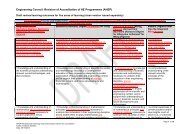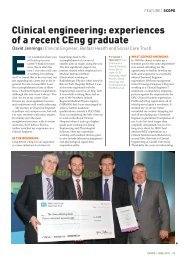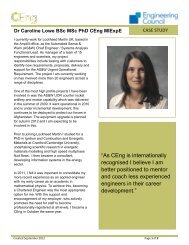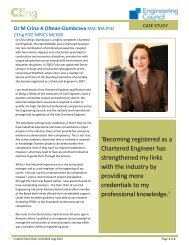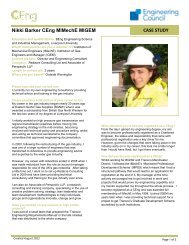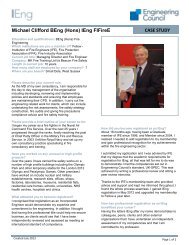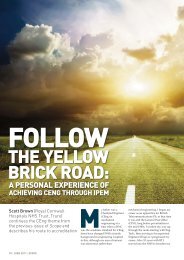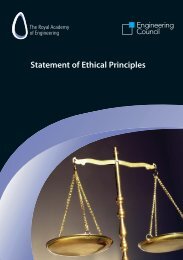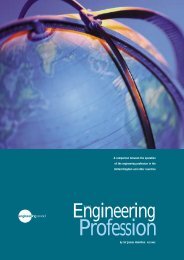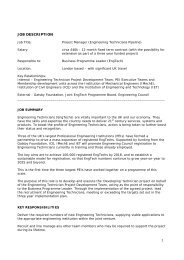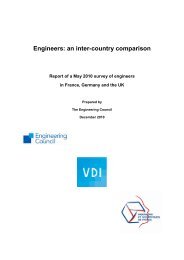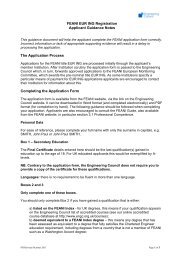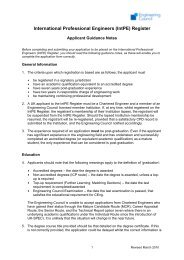An Engine for Change - A Chronicle of the Engineering Council
An Engine for Change - A Chronicle of the Engineering Council
An Engine for Change - A Chronicle of the Engineering Council
You also want an ePaper? Increase the reach of your titles
YUMPU automatically turns print PDFs into web optimized ePapers that Google loves.
128A CHRONICLE OF THE ENGINEERING COUNCILShortly after <strong>the</strong> publication <strong>of</strong> SARTOR-3, Pr<strong>of</strong>essor Levy retired from <strong>the</strong> EngC <strong>for</strong> asecond time his task having been completed, although he remained as a consultant until <strong>the</strong>end <strong>of</strong> 1998. He was succeeded as Director <strong>of</strong> <strong>the</strong> BER by <strong>An</strong>drew Ramsay, a CharteredSecretary and a Chartered <strong>Engine</strong>er, and <strong>the</strong> Secretary <strong>of</strong> CIBSE at <strong>the</strong> time. Immediatelyprior to <strong>the</strong> Fairclough re<strong>for</strong>ms <strong>of</strong> 1996 <strong>An</strong>drew Ramsay had chaired regular meetings <strong>of</strong> <strong>the</strong>Secretaries <strong>of</strong> <strong>the</strong> 12 largest Institutions. As <strong>the</strong>se meetings had been concerned with advisingon <strong>the</strong> structure and Byelaws <strong>for</strong> <strong>the</strong> re<strong>for</strong>med EngC <strong>An</strong>drew Ramsay was well versed on <strong>the</strong>latest developments.A Registration Standards Committee (RSC), under <strong>the</strong> chairmanship <strong>of</strong> Ge<strong>of</strong>f Fuller, wasestablished in 1997 to replace <strong>the</strong> moribund Registration Referral Committee and monitorSARTOR-3 and maintain Part 2 <strong>of</strong> this document, its members being nominated by <strong>the</strong> BERand <strong>the</strong> Institutions. The RSC held its first meeting in December and set up some task groups.This Committee also prepared several “second issue” documents, masterminded by PeterSwindlehurst, which were distributed in June 1998.A National Seminar on SARTOR-3 was held in 1998, widely attended by universities and <strong>the</strong>Institutions but regrettably not a few found it disappointingly unhelpful. Never<strong>the</strong>less, <strong>the</strong>EngC created a comprehensive library <strong>of</strong> source materials in 1998 and funded research into<strong>the</strong> early impact <strong>of</strong> SARTOR-3, incidentally discovering that a high proportion <strong>of</strong> Registered<strong>Engine</strong>ers included directors or chief executives <strong>of</strong> <strong>the</strong> FTSE 100 companies.In 1998 <strong>the</strong>n, <strong>the</strong> BER set <strong>the</strong> new standards and criteria <strong>for</strong> <strong>the</strong> registration <strong>of</strong> CEng, IEngand EngTech. Close links continued to be maintained, as in <strong>the</strong> previous two years, with <strong>the</strong>Institutions, <strong>the</strong> NVQ Forum, <strong>the</strong> Occupational Standards <strong>Council</strong> <strong>for</strong> <strong>Engine</strong>ering, JointAccreditation Boards and bodies representing engineering Higher Education and Fur<strong>the</strong>rEducation. The EngC met with engineer Vice Chancellors to discuss degree output standards,a continuing concern on all sides <strong>for</strong> a variety <strong>of</strong> reasons. The <strong>Engine</strong>ering Pr<strong>of</strong>essors’<strong>Council</strong>, still not reconciled to <strong>the</strong> specification <strong>of</strong> entry standards, continued its researchstudy with <strong>the</strong> aim <strong>of</strong> defining and assessing output standards as an alternative method <strong>of</strong>accreditation.Opinions on SARTOR-3Mike Heath:“During 1996, <strong>the</strong>re was some concern about <strong>the</strong> attitudes <strong>of</strong> our international colleaguesbecause <strong>of</strong> our perceived failure to match up to world standards. That <strong>the</strong>se concerns havenow dissipated owes everything to what I regard as <strong>the</strong> single greatest achievement <strong>of</strong> myperiod in <strong>of</strong>fice. That was <strong>the</strong> revising <strong>of</strong> SARTOR to challenge <strong>the</strong> educational standardsand structures currently prevailing in Britain and fundamentally to raise <strong>the</strong> standard <strong>for</strong>registration as an engineer in <strong>the</strong> UK.“The SARTOR revision had to be handled as a major campaign against determinedopposition from many in <strong>the</strong> Institutions and virulent opposition from many in <strong>the</strong> academiccommunity. The vested interest <strong>of</strong> <strong>the</strong> Institutions was that <strong>the</strong>y might suffer reducednumbers <strong>of</strong> members and, <strong>the</strong>re<strong>for</strong>e, income. To be fair, however, <strong>the</strong>re were many who© <strong>Engine</strong>ering <strong>Council</strong> UK 2004



